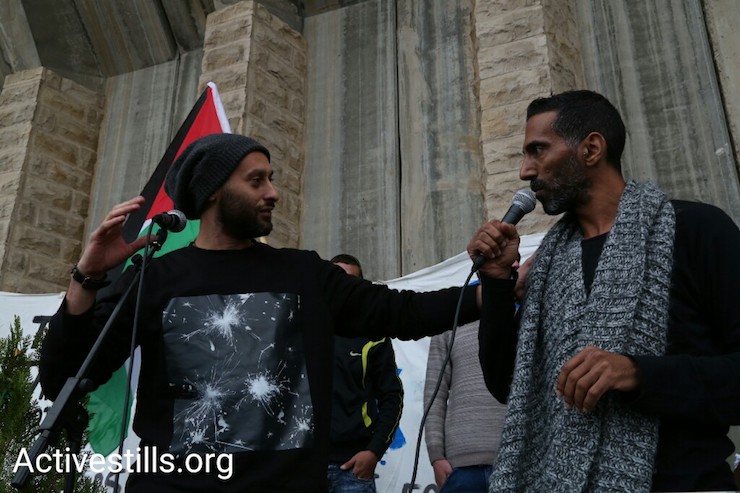The Right holds near total power in Israel, so why is it so afraid of poetry and theater productions?

Should a stranger come upon the public discussions happening in Israel over the past few years, he or she would be under the impression that the country is a global cultural powerhouse. From Al-Midan Theater, Jaffa’s Arab Hebrew Theater, the Ophir Prize — Israel’s version of the Oscars — to Palestinian poets Dareen Tatour and Mahmoud Darwish, the media and the public are in a frenzy over the face of Israeli culture.
In light of these discussions, one gets the impression that culture plays such a central role in Israeli society (statistics show that Israeli students receive the lowest grades in the literature and writing sections of their matriculation exams). Our society, however, still places a far greater emphasis on hard sciences rather humanities, and the cultural budget Israelis fight endlessly over constitutes a tiny percentage of the total state budget — far lower than that of other countries.
The story we tell ourselves
So how do we explain the Israeli obsession with culture? Yes, the cultural sphere is currently overseen by Miri Regev, a racist and violent woman who violently does her best to stay in the headlines. But this government excels in producing racist provocateurs, many of which are far more dangerous than Miri Regev in terms of the power they hold. The same goes for the current Knesset, the most extreme Israel has known to date, which proposes racist laws with far-reaching consequences on a regular basis.
Moreover, we are in an era in which the Right is enjoying an unprecedented amount of power. Its rule is absolute, the opposition is weak and paralyzed, and there is no real force that challenges it from the left. Why, then, did a small theater such as Al-Midan — which raised the culture minister’s ire when it ran a play written by a Palestinian citizen of Israel who was imprisoned for his role in the murder of an Israeli soldier — become a topic of national interest that leads Regev to total war?

There is a double answer to this question, which is tied to the very essence of culture itself. When culture is at its best, it does two opposite things: it challenges the collective narrative while also articulating it. The character of a society is formed not only by what it does, but also by the story it tells itself about itself. One of the roles of culture is to mirror the gap between deeds and narrative, thus constantly refreshing the collective story.
In Israel, the gap between deeds and the way we view ourselves is enormous, and it continues to grow as the regime grows more extreme. We act in one way, and tell ourselves an entirely different story. That is why at this point, when reality is dictated by the Right, it must work to bridge that gap. We can’t be occupiers, wage demographic and psychological war against Arab citizens, while also telling ourselves a story about being “Jewish and democratic.” That is why the Right must turn a poet like Dareen Tatour — who writes about the oppression of her people — as well as all those who support her, into terrorists. Because her poem, published on Facebook, undermines the narrative that Israel wants to tell about itself.
The same goes for Foxtrot, which won seven awards at the Ophir Awards ceremony last week. Regev had bashed the film, which looks at the effects of the occupation on Israeli society, calling it a “disgrace” that “shamed the reputation of the IDF” and showed “contempt for the state and its symbols.” Foxtrot, in my eyes, may have been overrated, but in a sense it does subvert the narrative of “the most moral army in the world,” and thus turns into a threat that must be done away with.
Culture? Israel prefers armed struggle
The second point that turns culture into a sensitive topic for an oppressive regime is its autonomous nature. Culture is an autonomous zone where communities can tell their stories. A regime that seeks total control over reality, as well as over how reality is described, will try to co-opt culture and enlist it in its official narrative as much as possible. When it is unable to do so, it will condemn and persecute cultural expression.
A prime example is Regev’s campaign to “promote Mizrahi culture,” which is an attempt to include the Mizrahi story in the wider Zionist narrative. But when Mizrahi artists challenge this co-optation — such as author Samir Naqqash, who never felt at home in Israel and considered himself an Iraqi in exile, or spoken word artist Yossi Tsabari, who performed a Mahmoud Darwish poem at last year’s award ceremony, prompting Regev to leave the room — they will find themselves excluded just like their Palestinian colleagues. Palestinian culture, on the other hand, is far less easily co-opted into the Zionist narrative, and thus constitutes a threat that the Right must fight.

Expressions of autonomous Palestinian identity are viewed by the State of Israel as a threat on other fronts as well. Outlawing the Islamic Movement and the persecution of Balad MKs is part of the same trend: any place we see the formation of an autonomous Palestinian identity beyond the reach of the state becomes a target for war. The same goes for the BDS movement. One must wonder why Israel views a nonviolent campaign as a threat to its existence. The answer, among other reasons, is that BDS is an autonomous Palestinian initiative in which Israel does not dictate the rules.
In this sense, Israel has a clear interest in diverting the Palestinian struggle from the nonviolent sphere — even if we are talking about a poem — to violence, where it can dictate the rules of the game. It is easier for Israel to deal with violent attacks and stone throwing than with plays and poets. The former confirm the story that Israel tells itself — one of eternal victimhood. The latter challenge this story and put up a mirror to Israeli society. Miri Regev, along with much of the public, don’t like what they see in that mirror. Every day it wakes up with a stone in hand to smash it. And yet, the mirror keeps reflecting everything we refuse to see.
This post was first published in Hebrew on Local Call. Read it here.

